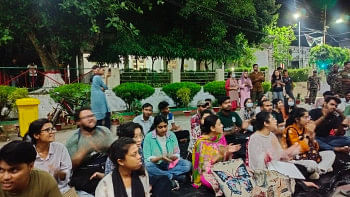Mergers ok, not monopoly

Maj Gen (retd) Manzurul Alam, chairman of Bangladesh Telecommunication Regulatory Authority (BTRC), expects that mobile phone subscription in the country will reach 50 million by the end of 2009. Photo: Amran Hossain
The telecoms regulator will not stand in the way of mergers between the country's mobile phone operators, but will set strict conditions to ensure no single company controls the market.
Speaking to The Daily Star, Major General Manzurul Alam (retd), chairman of the Bangladesh Telecommunication Regulatory Authority (BTRC), said he understood the business logic of mergers among the country's six operators, but said this could not be achieved at the cost of proper competition.
In the same interview Alam made clear his expectations for the mobile industry, forecasting 50 million subscribers in Bangladesh by the end of 2009 with the industry's turnover to exceed Tk50,000 crore in three years time.
He also hinted that the government might reduce the Tk800 tax on SIM (subscriber identification module) cards in the June budget.
On the downside the BTRC chief identified high bandwidth cost, the absence of an alternative submarine cable and the high tax structure as the main barriers for growth in the country's information and telecoms sectors.
Mobile telephony has grown rapidly in Bangladesh with more than 33 million subscribers registered at the end of November 2007. However with six operators now battling for customers, profitability has dropped.
Senior officials at the two largest operators Grameenphone and AKTEL have publicly said the market is overcrowded suggesting the number of operators could be reduced to three.
Alam accepted that mergers and acquisitions were common among rivals in a competitive market. "Obviously we will welcome such business tactics in the telecom market, but we will not allow amalgamations that will create a giant that controls the market, " he said.
"If any companies intend to merge, BTRC will fix-up a maximum market share limit, in line with that set in other countries, which should not be exceeded by the company," he said.
Alam said the success of the mobile market had profited the government, pointing to the surging taxes and government earnings from the sector. These could be tripled from last fiscal year's Tk500crore to Tk1500 crore within the next three years.
"To make this happen, the government should consider a low tax structure so that the customer base can be raised," Alam said.
Alam, who is also chairman of South Asian Telecommunication Regulators Council, believes that 50 percent of Bangladesh's population could adopt mobile technology.
Such a level would see a 'financial revolution' for the government as the telecoms sector would be a major contributor to the national exchequer. Already the mobile operators are the largest single tax payers.
To ensure this happens three major hurdles need to be removed, according to Alam. The high bandwidth price for internet connections, the reliance on a single submarine cable and the limited power of the regulator.
Alam termed the BTTB's (Bangladesh Telegraph and Telephone Board) bandwidth price as 'abnormally high' and said it should come down to Tk10, 000 per mega bites (Mb) from the current Tk80,000.
Low cost bandwidth is one of the major preconditions for the information and telecom industry to flourish, he said, adding that charges in Bangladesh are well above those of other countries in South Asia. For example while one mega bites bandwidth costs Tk80,000 in Dhaka it is around Tk1725 in India or Pakistan.
The second submarine cable is a must for expanding call centres, IP (Internet Protocol) telephony and software business.
"If we had an alternative submarine cable, Bangladesh would be a hub for the ICT outsourcing business," he said, adding that some Indian companies had already visited the BTRC office to inquire about shifting their call centre business to Bangladesh.
Asked about the recent drive against VoIP (voice over internet protocol), he said BTRC is not against VoIP technology, but operators should terminate calls through a legal gateway.
"We are at the final stage to issue licenses for a VoIP gateway. After that I believe telecom operators can recover their losses that they paid for using illegal VoIP," he said.
The BTRC chairman said his organsation needs full autonomy in order to increase the skill levels among staff. When regulating multinational companies BTRC had to be able to employ experts with knowledge of the international telecom market, he said.

 For all latest news, follow The Daily Star's Google News channel.
For all latest news, follow The Daily Star's Google News channel. 



Comments